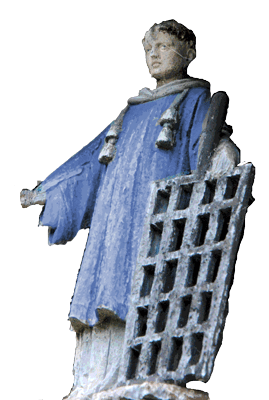
Welcome to St Laurence Church, Appleton with Besselsleigh
A welcoming and inclusive church serving the whole community

Welcome to St Laurence Church, Appleton with Besselsleigh
A welcoming and inclusive church serving the whole community
Holy Cross Day – 14 September 2025 The Invention and Exaltation or Triumph of the Holy Cross Evensong: Isaiah 63.1-16; I Cor 1.18-25 Today the church celebrates Holy Cross Day, which amalgamates two festivals: the Invention or Finding of the Holy Cross by St Helena; and the Exaltation or Triumph of the Holy Cross, by the Emperor Heraclius three hundred years later. The Empress Helena, mother of the Emperor Constantine went on pilgrimage to the Holy Land in the early 4th century, perhaps as a penance for her involvement in her son’s murder of his son and wife. She led a small archaeological expedition to the hill of Golgotha, and in 326 her team found three crosses buried in the earth. Unable to judge which of the three had been Christ’s, Tradition relates that she was happily granted two miracles to make the matter clear. In one, a woman touched all three crosses, only one of which cured her of her dreadful malady. In another, the dead body of a man brought for burial was placed on each of the crosses, but only when he was set down for the third time did life return to his body, indicating which cross was the cross of Christ, and which were the crosses of the robbers crucified with him. The Empress celebrated this discovery by building a church on the site, known ever since as the Church of the Holy Sepulchre or as the Church of the Resurrection. The second story – The Triumph of the Cross – takes place also on 13 September 628, when the emperor Heraclius won it back from the Persians who had stolen it fourteen years previously – in rather the same way that the enemies of Israel used to like to steal the Ark of the Covenant. Again, the next day it was lifted up or exalted so that the people could venerate it and have their faith renewed by the sight of it. And this renewal and confirmation of faith is surely what motivated the Empress in her initial searching for the Cross, the Persians in stealing it, and the Constantinopolitans in retrieving it. There is an understandable desire to root our spiritual beliefs in what is physical, tangible, unarguably real, especially when those beliefs belong to a relatively new religion that is being embedded into an Empire already filled to the brim with a pantheon of other gods, as was the case in the days of Constantine. For us, however, unless we have a relic of the True Cross hidden away in a corner of the underwear drawer, we have to get on without that sort of tangible object. When we try to learn to ‘be of the same mind as Christ Jesus, who was obedient unto death on a cross’ (as Paul puts it in Philippians 2), we must find the Cross wherever we go: figuratively, we find it in suffering or in injustice, or in self-sacrifices willingly made. Or we see crosses literally, in towns and villages on the churches we pass, or round the necks of the people we talk to, or where two branches meet on a tree and go their different ways. We might even catch a glimpse of the Cross in flags of St George which always fly as an unequivocal sign of the love of God, neighbour and hard-pressed stranger . And when we do, we do not lift those crosses high – how could we? – but we lift high our hearts and minds as we dedicate ourselves afresh to that topsy-turvy life of sacrifice in which God is content to behave like a condemned slave, in order that humankind might be taught how to love, and be raised up with Christ, not perishing but redeemed, enjoying the fruit of the tree of life which is eternal union with God. This Holy Cross is, to us, neither a stumbling-block nor foolishness (as St Paul teaches us this evening), but is rather the power of God and the wisdom of God. Let us, therefore, seek the True Cross not hidden in the earth, needing spades and trowels to exhume it. Let us rather find it at work in ourselves, crucifying all that hinders us in our life with God; putting to death all sin and selfishness, and bringing to birth a wisdom and a light which will raise many eyes to the Gospel-promises of Christ who (as Isaiah foresees), ‘became our Saviour in our distress’ and ‘redeemed us in his pity’. May his holy and life-giving Cross protect us all our days!
